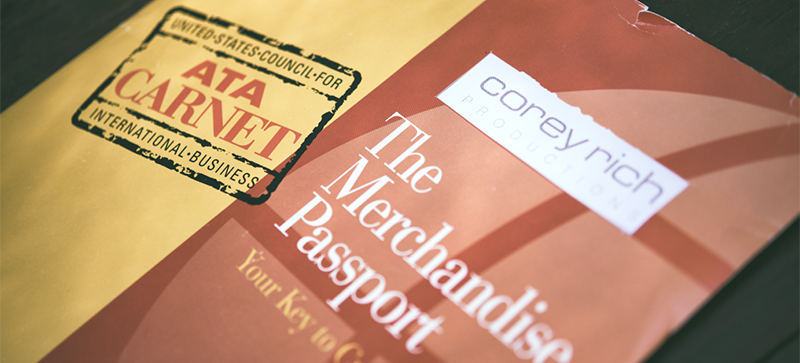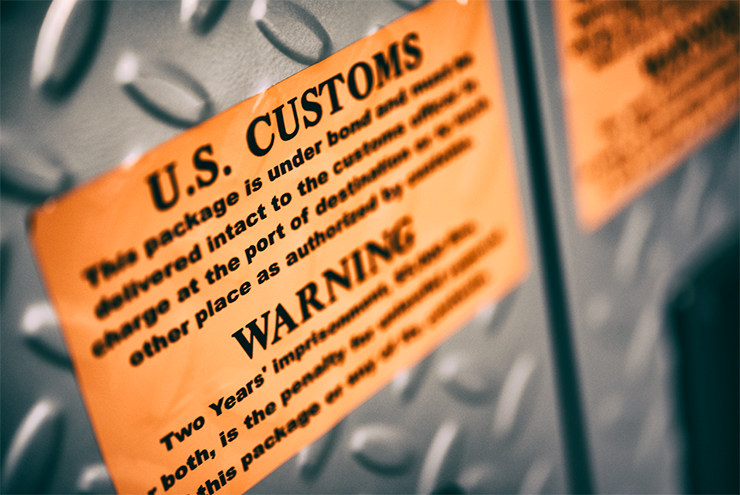Hey Corey,
I noticed a few months ago you posted that a bunch of your gear got confiscated at the U.S. border. What happened? And how do I avoid that happening to me?
—Paul, via Facebook
Well that’s a really good question and the answer is actually very straightforward. There are a lot of laws in the United States that, while they’re on the books, just don’t get enforced. For example, did you know that there’s actually a law that states it’s illegal to kiss on a train in Wisconsin? In Florida, you may not break more than three dishes per day. And in Boise, Idaho, residents may not “fish from a giraffe’s back.”
That’s all true, too!
Well, like those laws, there are other laws that just as rarely get enforced. For example, if the speed limit is 55 miles per hour, would you ever expect to get a speeding ticket for going 57?
When you travel in and out of the United States with photo, video and lighting equipment for professional shoots, you’re supposed to pull a carnet, which is basically like a passport for your equipment.
Carnets are international customs documents that are used for commercial samples, professional equipment and goods for exhibitions and fairs. The reason countries want you to have a carnet is to prevent you from selling goods on the black market and skip out on paying the taxes on that sale. Governments, understandably, don’t want to miss out on the sale of that equipment.
With that said, I am constantly traveling. I’m often in and out of the United States on a monthly basis. And in all of my travels, I’ve never been asked about a carnet to get back into the United States. Ever.
That’s not to say that we never pull carnets. We do periodically, when we know we’re entering a country that has issues with equipment coming and leaving. We pulled carnets for Scotland and Ireland last year, for example.
On this particular occasion, returning to the U.S. from Argentina through the Houston International Airport, I got caught doing 57 in a 55, so to speak. I didn’t have a carnet.
Do I accept full responsibility for the fact that I didn’t have the proper documentation? Yes, of course. I was wrong.
In theory, we should’ve had a carnet for all of our equipment.
You can acquire an “ATA Carnet” from the United States Council for International Business: http://www.merchandisepassport.org. The ATA Carnet costs somewhere between $225 and $380—the rate is dependent on how much your serialized (i.e., anything that has a serial number) professional camera equipment costs. They use a bracket system; for example, if your total serialized equipment is valued somewhere between $1-$9,999, a carnet costs $225. At the top end, transporting camera equipment over $250,000 would mean a $380 carnet.
What was ridiculous about what happened to me in Houston was that the customs officer confiscated cases filled with items that have no serial number. One case just had black cloth, gaff tape and extension cords! Clearly a case of this individual not understanding what the heck she was doing.
I could’ve also filed a Certificate of Registration, form 4455, and that would’ve worked, too and it’s free.
The ATA Carnet document works for many but not all countries. Argentina, for example, where we were returning from, does not accept the ATA Carnet.
Anyway, hope this helps. We’ve since recovered all our equipment.
And even though it feels as if we got busted for doing 57 in a 55, we’re probably going to make sure we always have the proper documentation going forward. I suggest you do, too.
If you need to pull at carnet or have questions, here a couple carnet brokers that can help the process along.
Western Overseas: http://www.westernoverseas.com/global/
Boomerang Carnets: http://www.atacarnet.com//
Additionally, you can contact your local US Customs office through the Department of Homeland security and put your tax dollars to use. They can help you facilitate a Certificate of Registration for your gear: http://www.cbp.gov/sites/default/files/documents/CBP%20Form%204455_0.pdf


4 comments
Thanks for the very helpful post! Would you consider posting some advice, anecdotes, or horror stories about work visas? Cheers, -Ed
Work visa is indeed another thing that photographers tend to forget when traveling. A friend of mine has now been banned from India, his favourite destination, after being busted for doing photojournalism on a tourist visa.
Drones are getting ever more popular with photographers, but they too can land you in hot water without the proper paperwork. Like this: http://www.bbc.com/news/world-europe-31717604
Hi Corey,
Have you experiences customs issues in and out of Nepal? What’s that like? Thanks- Behzad
Great Post Corey – glad that you’ve managed to retrieve all the gear again.
@Behzad: I have travelled both into Nepal and across borders between China/Nepal in the past with significant amounts of gear and I find it to be a bit hit and miss as they rarely know what a Carnet is – last time I was in KTM I simply showed them a screenshot of my invoices for the gear (via Evernote) and a signed (simplified) document by a lawyer (friend of mine) declaring that all equipment was legally mine and that it was intended for personal usage. I don’t say this works for everyone but quite often in 3rd world countries it all comes down to curiosity, corruption or simply establishing a standpoint as to ‘who’s the boss’ All countries are different and as CR points out not two Airport Officers have the same view on things however, I always recommend researching the legal requirements prior to traveling any where – just in case!
Morts
Comments are closed.